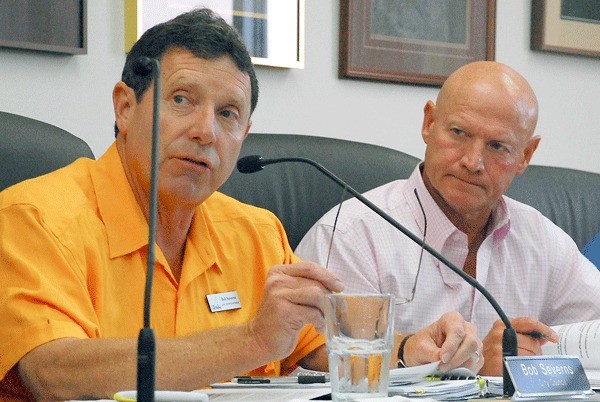More than a week after Oak Harbor City Councilman Scott Dudley publicly implicated a fellow council member of wrongdoing for voting on the SE Pioneer Way improvement project, it is still unclear whether Councilman Bob Severns actually has a conflict of interest.
Severns, other council members, and the city attorney all maintain he was well within his legal rights to vote on the project. They also aren’t too happy with Dudley’s apparent attempts to hamstring the controversial one-way street project either.
“I think it’s a form of sabotaging the council’s decision,” City Councilman Rick Almberg said.
The decision to move forward with the plan has been made, said Almberg, and Dudley needs to get on board. City Councilman Danny Paggao, who originally voted for a two-way project, agreed. Decisions are made in a democratic process and the “majority has spoken,” he said.
However, he admitted he is a little nervous about what implications may result from Dudley’s actions, saying he hopes the county commissioners don’t take back the money given to the city for Pioneer Way development.
Last week, Dudley stood before the Island County commissioners and suggested that Severns may have acted inappropriately by voting on the project, because Severns is a partner in the limited liability corporation, Makers Mark, which owns commercial office space on Bayshore Drive. State law makes it clear that local elected officials cannot be beneficially interested, directly or indirectly, on any contracts they vote on.
It is not clear, however, whether Severns will actually receive financial gain from the one-way project. Opponents of the street plan maintain he will benefit because the plan will by default route traffic along Bayshore directly in front of the Maker Mark building. The office space is currently rented to a dentist, an insurance firm and a web company.
Severns counters that Dudley’s charges are unfounded and that he did nothing wrong. In fact, he said he had his own concerns and checked with city staff and attorneys before participating in the controversial issue last year.
“The city maintains, and still does, that this was a legislative issue and not a quasi-judicial issue,” Severns said. “Therefore, not only could I hear it but that I probably should.”
Decisions by local elected officials fall into two categories, those that are legislative — creating policy — and those that are not. The ones that are not are called quasi-judicial and typically involve decisions that resemble those of a court or judge. One of the most common is deciding upon development applications.
According to City Attorney Margery Hite, local elected officials are only required to recuse themselves when voting on quasi-judicial issues, and there was no application in front of the council when it voted to proceed with the $8.35 million Pioneer Way project. It was a policy decision, she said.
Severns didn’t just participate in the initial 4-3 vote to proceed with the road renovation. He has voted on several project-related issues over the past year, from contracts to bury utility lines and create design plans to the hiring of legal teams for the procurement of sidewalk easements.
Severns said he does not believe it’s a stretch to count those as policy decisions as well. While he would “have welcomed the opportunity to recuse himself,” he said these were all important issues and he felt responsible to participate.
“I ran for office to make decisions,” he said.
It has been suggested that Almberg may also have a conflict of interest. His stepson, Hans Juhl, owns property on SE Pioneer Way. Almberg claims he not only has no financial connection to the property and business, but also maintains that all public works projects are legislative in nature because they benefit everyone.
“I don’t know how you could make it any other way because they are community facilities,” Almberg said.
But while Severns, Almberg and city officials all say that no one needed to recuse themselves, Melanie de Leon, executive director of the Washington Executive Ethics Board, said this situation would certainly warrant concern with her if Severns were a member of the executive branch of government or a state employee.
“In this case, I would say there was a conflict of interest if this person were a state employee,” de Leon said.
Her comment may not be a barometer as to whether Severns or Almberg should have recused themselves, as the ethics board does not have jurisdiction over municipal officers. They are governed by a different set of state rules than those that regulate the executive branch of government and state employees, she said.
However, the two sets of rules are very similar. Both are designed to ensure that decision makers are not benefiting from their rulings.
Organizations dedicated to working with municipalities for better government such as the Municipal Research and Services Center of Washington and the Association of Washington Cities declined to comment on the issue.
Severns said he does not believe that Dudley’s public implications were personal attacks, only that he is against the project and was using the recusal issue as a tool to scuttle the controversial one-way plan, which many downtown business owners oppose.
Severns suggested that Dudley, who may have political ambitions, could have other motives.
“It’s one of a handful of cards,” he said.



